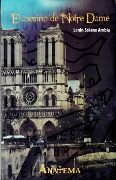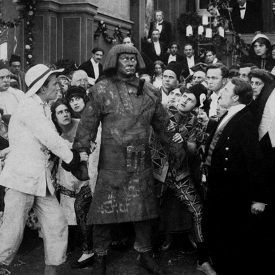 The dust jacket copy of British author Jasper Fforde’s debut novel, The Eyre Affair, makes comparisons to The Hitchhiker’s Guide to the Galaxy, and numerous reviewers have likened Fforde’s style to that of Douglas Adams. So before I go any further, I want to get this out of the way. Do not read The Eyre Affair expecting something along the lines of Adams’ Hitchhiker’s series, because one isn’t much like the other. It is an unfortunate trend in the industry over the last three decades that nearly all humorous science fiction novels get erroneously compared to Hitchhiker’s. This is particularly true if the writer happens to be British. So save yourself the disappointment, don’t read The Eyre Affair looking for Douglas Adams, read it for what it is: a highly entertaining, genre-blending, literary detective novel with plenty of laughs.
The dust jacket copy of British author Jasper Fforde’s debut novel, The Eyre Affair, makes comparisons to The Hitchhiker’s Guide to the Galaxy, and numerous reviewers have likened Fforde’s style to that of Douglas Adams. So before I go any further, I want to get this out of the way. Do not read The Eyre Affair expecting something along the lines of Adams’ Hitchhiker’s series, because one isn’t much like the other. It is an unfortunate trend in the industry over the last three decades that nearly all humorous science fiction novels get erroneously compared to Hitchhiker’s. This is particularly true if the writer happens to be British. So save yourself the disappointment, don’t read The Eyre Affair looking for Douglas Adams, read it for what it is: a highly entertaining, genre-blending, literary detective novel with plenty of laughs.
Thursday Next, the plucky female lead character of The Eyre Affair, is a literary detective in an alternate 1985 England. And by alternate, I don’t simply mean alternate history. While there are some elements of the alternate history genre—in that England is still mired in the Crimean War and Wales has become a separate U.S.S.R.-like socialist republic—Fforde doesn’t limit his genre mixing to a few categories. In this gonzo alternate universe you will find cloned pet dodo birds, vampires, war, dirigibles, time travel, demonic villains, plasma guns, dystopian bureaucracy, corporate villainy, black holes on the highway, thesaurus maggots, and romance. And perhaps most unlikely of all, this is a world obsessed with literature. Children collect Henry Fielding bubblegum cards, factions representing differing poets clash violently in the streets, audiences participate in Shakespeare productions reminiscent of The Rocky Horror Picture Show, and underworld literary forgery is both lucrative and rampant. Nowhere else would you hear about a special agent being shot dead in a “bookbuy that went wrong.”
Enter Acheron Hades, villain extraordinaire and one of the most fun characters in the book, who claims, “I’m not mad, I’m just … well, differently moraled.” He steals the original manuscript of Dickens’ Martin Chuzzlewit, threatening to kill off the characters if his demands are not met. Thursday Next must battle him in a series of confrontations that eventually lead them inside the pages of Charlotte Brontë’s Jane Eyre.
If this all sounds like a dream comedy for English majors and Brontë fans, you are probably right, but as I am not one of them, I can attest that you don’t need to have read Jane Eyre to enjoy The Eyre Affair. Fforde fills you in on what you need to know without bogging the pace down with backstory. And the rich blend of genres really has something for everyone.
As always, Scide Splitters is primarily concerned with assessing the humor in a book. For The Eyre Affair, much of the humor arises from the weird particulars of the alternate world Fforde has created and the equally eccentric characters who populate it. Highbrow humor is contrasted by pure silliness, such as character names like Jack Schitt and Turner Paige. Essentially, Fforde is all over the map in both humor and genre. The Eyre Affair is a rollercoaster of the off-beat that I think most humor fans will enjoy. Just ignore the Adams comparisons and appreciate Fforde for the unique voice that is his. If you haven’t tried any of the Thursday Next series, you have a lot of fun ahead of you because the series is now up to seven volumes, the most recent being The Woman Who Died a Lot, released in the US in paperback in September by Penguin Books.











No, not yet. It is on my “to read” list, but that is not saying much because the list hopelessly exceeds my life expectancy. Have you read it? If so, what did you think?
I adore the Thursday Next series – have you checked out his Shades of Grey?